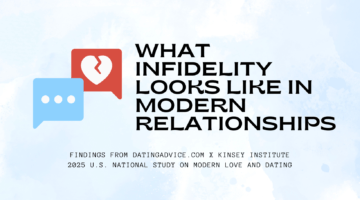One in Five People Report Having Been in a Sexually Open Relationship
April 17, 2019 by Justin Lehmiller
How many people have ever been involved in a consensual non-monogamous (CNM) relationship before? The results of two recent studies involving nationally representative samples (one from the United States and one from Canada) reached nearly identical conclusions: approximately 20% (or 1 in 5) respondents said they had.
The U.S. study is from 2016 and it was previously covered on the blog here; however, the Canadian study just came out, so here are a few of the highlights from it.
· The survey was conducted in 2017 and was based on a representative sample of 2,003 Canadian adults aged 18-94.
· Overall, 2.4% of participants said they were currently involved in an open relationship. For purposes of this study, an “open relationship” was defined as one in which “both partners agree that they can each engage in some amount of sexual and/or romantic activity with people other than each other. Both partners consent to the activity, decide what is acceptable, and are open and honest about their sexual/romantic activities. Polyamorous and Swinger are two types of open relationships.”
· Among those who were currently in a romantic relationship of some type, 4% described their relationship as open. This number is in line with the results of other surveys, which have suggested that about 5% of people in relationships are consensually non-monogamous.
· Men were significantly more likely to have been in an open relationship compared to women (25% vs. 15%, respectively). This is consistent with previous research, finding that men are more interested in and experienced with consensual non-monogamy.
· Younger adults were more experienced with open relationships than older adults, suggesting there may be generational differences in openness to consensual non-monogamy.
· 12% of participants said that being in some type of sexually open relationship would be their ideal, meaning that more people want to be in CNM relationships than are currently in them.
· Persons in monogamous and CNM relationships did not differ from one another overall in terms of relationship satisfaction—in other words, one kind of relationship wasn’t necessarily “better” than the other. However, and perhaps not surprisingly, people who were in monogamous relationships in which they had cheated were significantly less satisfied than everyone else.
· People who were in a monogamous relationship who had not cheated but who saw being in a CNM relationship as their ideal were also less satisfied. In other words, people tend to be less happy when there’s a mismatch between their actual and ideal relationship type.
These findings are important because they replicate previous results regarding the prevalence of lifetime and current open relationship status with data from a nationally representative sample. In addition, they provide further support for the idea that different types of relationships seem to work well for different people.
Want to learn more about Sex and Psychology ? Click here for previous articles or follow the blog on Facebook (facebook.com/psychologyofsex), Twitter (@JustinLehmiller), or Reddit (reddit.com/r/psychologyofsex) to receive updates. You can also follow Dr. Lehmiller on YouTube and Instagram.
To learn more about this research, see: Fairbrother, N., Hart, T. A., & Fairbrother, M. (2019). Open Relationship Prevalence, Characteristics, and Correlates in a Nationally Representative Sample of Canadian Adults. The Journal of Sex Research.
Image Credit: 123RF/Oksana Tsvyk

Dr. Justin Lehmiller
Founder & Owner of Sex and PsychologyDr. Justin Lehmiller is a social psychologist and Research Fellow at The Kinsey Institute. He runs the Sex and Psychology blog and podcast and is author of the popular book Tell Me What You Want. Dr. Lehmiller is an award-winning educator, and a prolific researcher who has published more than 50 academic works.
Read full bio >


